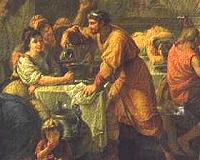 The romans called it Dies Natalis Invicti Solis, the Birthday of the Unconquered
Sun. The Roman midwinter holiday, Saturnalia, was both a gigantic fair and
a festival of the home. Riotous merry-making took place, and the halls of
houses were decked with boughs of laurel and evergreen trees. Lamps were kept
burning to ward off the spirits of darkness. Schools were closed, the army
rested, and no criminals were executed. Friends visited one another, bringing
good-luck gifts of fruit, cakes, candles, dolls, jewellery, and incense. Temples
were decorated with evergreens symbolizing life's continuity, and processions
of people with masked or blackened faces and fantastic hats danced through
the streets. The custom of mummers visiting their neighbours in costume, which
is still alive in Newfoundland, is descended from these masked processions.
Roman masters feasted with slaves, who were given the freedom to do and say
what they liked (the medieval custom of all the inhabitants of the manor,
including servants and lords alike, sitting down together for a great Christmas
feast, came from this tradition). A Mock King was appointed to take charge
of the revels (the Lord of Misrule of medieval Christmas festivities had his
origin here). (from Winter
Solstice Traditions)
The romans called it Dies Natalis Invicti Solis, the Birthday of the Unconquered
Sun. The Roman midwinter holiday, Saturnalia, was both a gigantic fair and
a festival of the home. Riotous merry-making took place, and the halls of
houses were decked with boughs of laurel and evergreen trees. Lamps were kept
burning to ward off the spirits of darkness. Schools were closed, the army
rested, and no criminals were executed. Friends visited one another, bringing
good-luck gifts of fruit, cakes, candles, dolls, jewellery, and incense. Temples
were decorated with evergreens symbolizing life's continuity, and processions
of people with masked or blackened faces and fantastic hats danced through
the streets. The custom of mummers visiting their neighbours in costume, which
is still alive in Newfoundland, is descended from these masked processions.
Roman masters feasted with slaves, who were given the freedom to do and say
what they liked (the medieval custom of all the inhabitants of the manor,
including servants and lords alike, sitting down together for a great Christmas
feast, came from this tradition). A Mock King was appointed to take charge
of the revels (the Lord of Misrule of medieval Christmas festivities had his
origin here). (from Winter
Solstice Traditions)
Saturnalia - A Winter Solstice Ritual combining the rites of Saturnalia, Brumalia, and Ops.
The Julian Society, a non-denominational religious order dedicated to the restoration of paganism envisioned by the Emperor Julian, "to reinstate noble virtues and purposes within all Pagan religion, to make Pagan teachings available to all, and to continue the rites and public worship of all ancient Pagan deities."
Religio Romana, Roman religion in antiquity and today.